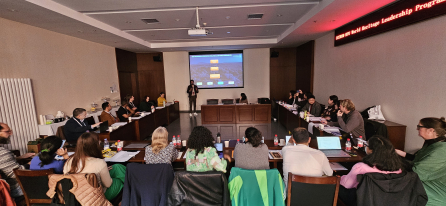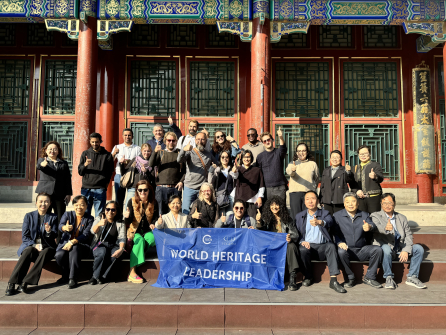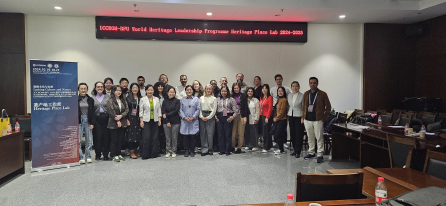The second edition of the Heritage Place Lab (HPL), organized by the ICCROM-IUCN World Heritage Leadership (WHL) Programme, was delivered in a blended format – online and in-person – from September 2024 to April 2025. The second edition of HPL drew on the lessons learned from the 2021-2022 pilot edition and focused on supporting the development of practice-led Research Agendas that address key priorities in heritage management.
WHL held two separate calls for applications: the first to identify five World Heritage properties, and the second to match each site with researchers whose research foci align with the site managers’ identified challenges. The goal was to form international and interdisciplinary Research-Practice teams that collaborate through knowledge exchange on issues such as engaging Indigenous Peoples and local communities, integrating distinct knowledge systems, managing risks, and navigating development pressures.
Finding solutions to heritage challenges through global collaborations
The five Research-Practice Teams were composed of the following institutions:
Research-Practice Team of Al-Ahsa Oasis, an Evolving Cultural Landscape (Saudi Arabia)
Heritage Commission of the Kingdom of Saudi Arabia
University of Tasmania, Australia
University of Cape Town, South Africa
Castle of the Teutonic Order in Malbork (Poland)
Malbork Castle Museum, Poland
Heritage Management Committee of ICOMOS Poland
University of Tokyo, Japan
University of Gothenborg, Sweden
Cultural Sites of Al Ain (Hafit, Hili, Bidaa Bint Saud and Oases Areas), United Arab Emirates
Department of Culture and Tourism of Abu Dhabi, United Arab Emirates
University of Engineering and Technology, Peru
Woxsen University, India
Mount Huangshan, China
Huangshan World Heritage Management Office, China
Huangshan Global Geopark Management Office, China
Huangshan World Biosphere Reserve Management Office, China
Beijing Forestry University, China
Port Arthur Historic Site, Coal Mines Historic Site, components of the Australian Convict Sites, Australia
Port Arthur Historic Site Management Authority, Australia
Deakin University, Australia
Polytechnic University of Turin, Italy
HPL was implemented through five online workshops and one in-person session to facilitate collaboration between the five site management teams and researchers from nine academic institutions, with an emphasis on developing practice-led Research Agendas.
The workshops applied the Enhancing Our Heritage Toolkit 2.0 to assess the effectiveness of heritage management systems, identify existing challenges, and explore jointly with researchers how research can contribute to better understanding priority issues and offer practical solutions.
The workshops covered the following
Workshop I: Heritage Place I - Values and attributes and factors affecting the property
Workshop II: Heritage Place II - Boundaries, buffer zone(s) and wider setting; legal and customary frameworks and governance arrangements
Workshop III: Building a collaborative Research Agenda, which was held in collaboration with the Beijing Forestry University and in conjunction with the ICCROM-BFU Heritage and Landscape Conservation Conference 2024 ‘Linking Culture and Nature’
Workshop IV: Development Issues and Impact Assessment
Workshop V: Climate change and Indigenous, Traditional and Local Knowledge
Workshop VI: Presentation of Research Agendas
The five Research Agendas prepared at the second edition of the HPL focus on assessing existing management challenges at the five World Heritage properties and identifying priority areas for future research. Furthermore, they provide insight on how the collaboration between researchers and site managers was developed, and which tools they used to explore research themes.
The Research Agendas developed can be consulted at the links below.
Research-Agenda of Al-Ahsa Oasis, an Evolving Cultural Landscape (Saudi Arabia)
Research-Agenda of Castle of the Teutonic Order in Malbork (Poland)
Research Agenda of Mount Huangshan, China
About the Heritage Place Lab and the results of the first edition
The HPL is a capacity-building and networking activity of WHL. It focuses on strengthening networks across research and site management within the context of implementing the World Heritage Convention. It aims to facilitate and support research-practice teams in defining practice-oriented research agendas for World Heritage properties.
The pilot edition of HPL was implemented from September 2021 to April 2022 and it involved Research-Practice Teams from eight World Heritage sites: Asante Traditional Buildings, Ghana; Antigua Guatemala, Guatemala; Great Zimbabwe National Monument, Zimbabwe; Jaipur City, Rajasthan, India;
Historic Sanctuary of Machu Picchu, Peru; Okavango Delta, Botswana; Quebrada de Humahuaca, Argentina; and Rjukan-Notodden Industrial Heritage Site, Norway.
The process implemented in the pilot edition and the Research-Agendas prepared by the Research-Practice Teams are explained in the publication ‘Heritage Place Lab: A Model for Research-Practice Collaboration in the Context of World Heritage’ (2024) and the Special Issue ‘Towards practice-led research agendas for World Heritage properties’ of the Journal of Cultural Heritage Management and Sustainable Development (JCHMSD) published in August 2023.



